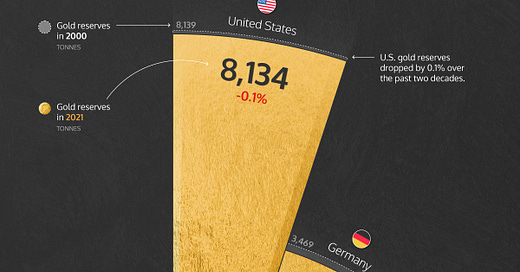“People like to say that to know where we're going, you have to understand where we've been. But I think more realistic is admitting that if you know where we've been, you realize that we have no idea where we're going. Events can compound in unfathomable ways. And again, everyone has a story like this, whether it's about your own career or how you met your spouse. Sometimes the stories are great and they have happy endings and other times they don't.
~ Morgan Housel Podcast Fluke [Emphasis mine]
In a small corner of the financial world a discernible amount of hissing and squawking and other sounds evocative of geese having their feathers plucked can be registered as the gathering approaches of the leaders of the BRICS nations in Johannesburg for their summit from the 22nd August to the 24th. The frenzied hissing is that of financial market commentators and economic pundits speculating on whether these leaders, whose countries represent some 40% of global GDP will or will not announce the creation of a new currency regime in whatever joint statement they issue to a world waiting with bated breath. This topic is profoundly uninteresting to the overwhelming part of the globe’s population and indeed, once you get into the nitty-gritty of how currency regimes actually work, the descent into the mind-numbing realm of technical detail such as OCA criteria (Optimal Currency Area), settlement issues, convertibility, issuance, interest rate convergence and bell-wether currency shadowing is ineluctable. This is the dark realm of macro economic PhDs and policy wonks, not a place in which you want to spend much time hanging out.
Nonetheless, the question of whether or not the Brickies decide to announce an exclusive currency regime limited to their member states next week or not is moot. The move to some sort of alternative inter-nation settlement system that does not involve the US-Dollar became a necessity once President Biden’s administration’s 2022 nullification of Russia’s US-$ reserve assets in the wake of a broader sweep of - largely counterproductive - sanctions, effectively weaponised the hegemon’s currency. That act all by itself put America’s non-allied global trading partners and competitors on DEFCON 3, irrespective how long or how specifically their plans for a US-$ alternative might previously have been percolating on the back of the stove.
When playing three dimensional chess against Russian and Chinese Grandmasters it is a good idea to be able to think at least three moves ahead and it is especially important not to under-estimate them and to over-estimate yourself. US foreign policy over the past fifty years has, unfortunately, been one long series of doing both at increasing levels of incompetence. Long gone are the latterday Metternichs in the US State Department like George Kennan whose ability to understand and articulate the long games that these competitive nations were playing were legendary. The political and mandarin classes of the hegemon and her allies are cut from softer, less durable wood than their predecessors at a time when their counterparts are growing in strength, resourcefulness and resources.
And they have time. I think it was Luke Gromen in a conversation with Grant Williams last year who pointed out that in a war of attrition between a massive highly levered balance sheet (USA) and a smaller asset-rich one (Russia), the deciding factor is the time frame - asset rich beats highly levered over time every time. The BRICS and their allies and satellite trading blocs (primarily EEU and Shanghai Group) plus a few other heavyweight partners such as Turkey, Saudi Arabia and Iran represent some of the most asset and natural resource-rich nations in the world and they are on the right side of the commodity cycle currently. The answer to the question of who wins this if nothing changes is obvious.
Keep reading with a 7-day free trial
Subscribe to Pitchfork Papers to keep reading this post and get 7 days of free access to the full post archives.



